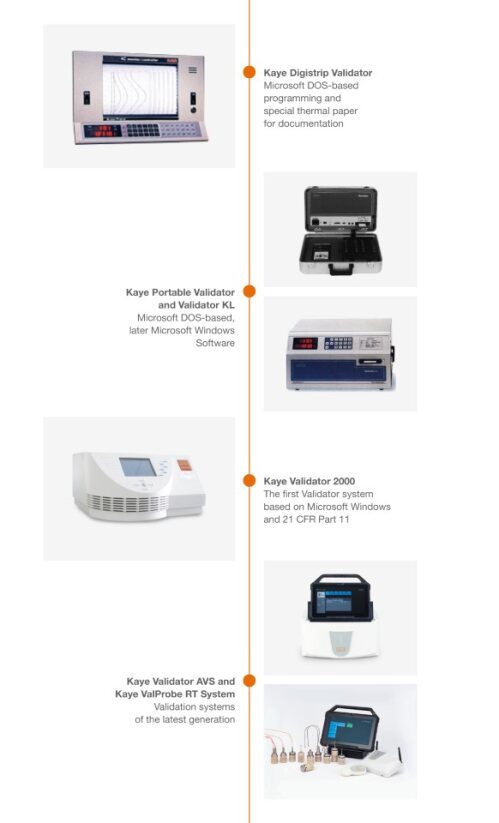Looking back on the exciting technological history of the 90s, one can't help but feel a sense of nostalgia for achievements like 3.5" diskettes, Excel spreadsheet calculations, or thermal paper printouts. That decade saw the pharmaceutical industry and regulatory authorities still in their infancy when it came to issues like data security, data integrity or even the ALCOA principles.
Microsoft DOS-based measurement systems, handwritten documents or basic paper recording instruments were the standard tools of the day. In fact, manipulating measurement data (either unintentionally or intentionally) was probably easier than hitting play on a Walkman. A quiet, humorous undertone of the zeitgeist even suggested that GMP (Good Manufacturing Practice) should be interpreted as "Give Me Paper". Plainly put, the trust in electronically generated measurement data was at a very low level.
But in the midst of this technological change, the FDA – the U.S. Food and Drug Administration – responded to the rapid digitalization and introduced the groundbreaking 21 CFR Part 11 regulation in 1997. With its implementation, specific criteria were defined, under which electronic records and signatures would be recognized as equivalent to handwritten notes and signatures.
In this blog post, we focus on the pioneering role of Kaye in implementing this revolutionary regulation for measuring systems, specifically for the validation of thermal processes. Join us as we delve into a perspective of technological history and the ongoing innovative implementation of new regulations in the Kaye product range.
What do data integrity, data security, and ALCOA mean?
Data integrity, data security, and ALCOA are essential concepts in the pharmaceutical environment, especially in the field of quality assurance and regulatory compliance.
Data integrity refers to the accuracy, completeness, and consistency of data throughout its entire lifecycle. In the pharmaceutical industry, a high level of data integrity is crucial to ensure that the data generated in clinical trials, production processes, or during quality controls is reliable and correct.
Data security encompasses the protection of data from unauthorized access, manipulation, and loss. It represents a fundamental prerequisite for ensuring data integrity and safeguarding sensitive information, such as formulations or other trade secrets.
ALCOA is an acronym that stands for the core principles of data integrity:
- Attributable: Every action must be attributed to a specific person.
- Legible: The records must be permanently stored in a readable form.
- Contemporaneous: The data must be recorded at the time of the event.
- Original: The original data must be retained and accessible.
- Accurate: The data must be correct, and mistakes or changes must be documented.
The correct application of these principles helps to ensure data integrity in the pharmaceutical industry and to document regulatory compliance.
The introduction of 21 CFR Part 11 in August 1997 was a crucial step regarding the manipulation of raw data. Terms like audit trail, encryption of raw data, data redundancy, or access regulation were new, and both the users and suppliers of relevant measurement systems faced a challenging task that needed to be implemented technically.
How was this implemented in the Kaye product line?
The answer is simple. Based on its already established experience as a recognized supplier of validation systems and in accordance with its company philosophy, Kaye introduced the first 21 CFR Part 11 compliant validation system, the Kaye Validator 2000, in 1999. This met the increasingly stringent requirements regarding data security and all the other requirements listed in this regulation.
The Kaye Validator 2000 was a standalone validation system that simplified the entire validation process: It reduced setup time, minimized the handling of sensors, and presented important study data in an easily customizable report format. This advanced system was specifically designed to meet the requirements of the 21 CFR Part 11. It met the international and European standards for validating applications in the pharmaceutical industry, biotechnology, and medical device manufacturing. In addition, it included an improved and expanded software for user-friendly data management and handling. In doing so, it considered the proven and accepted procedures for precise measurement of temperature and pressure that were already used in previous Kaye models, like the Digistrip Validator, the Portable Validator, and the Validator KL.
Thus, it was a consistent implementation of regulatory requirements for a recognized, user-friendly, technical solution. The Kaye Validator 2000 was the first validation system available on the market that met these requirements.
Conclusion
This article has summarized the pioneering role of Kaye in implementing technical standards and regulatory requirements in the pharmaceutical and biotechnological industry. With the introduction of the FDA's 21 CFR Part 11 guidelines in 1997, data security and integrity took center stage. In response to this transformation from a simple chart recorder to a complex data evaluation unit, the Kaye Validator 2000 was launched in 1999, the first validation system that met 21 CFR Part 11 requirements and simultaneously facilitated efficient validation of thermal processes. With its user-friendly data management software and precise temperature and pressure measurement functions, which were based on tried and tested procedures, the Kaye Validator 2000 represented a groundbreaking solution that has significantly shaped the transformation in the validation of thermal processes. This demonstrates that continuous innovation and consistent adaptation to regulatory changes are crucial for progress in the pharmaceutical and biotechnological industry.
The journey from a simple chart recorder to a complex measurement unit, adhering to all regulatory requirements for both hardware and software:

To enquire about a product or service, you can reach out to us online and one of our representatives will be happy to assist you! To contact us, please visit us here: https://www.kayeinstruments.com/en/contact
To request a demo of any of our products, please visit our demo request website here: https://www.kayeinstruments.com/en/demo
Follow us on LinkedIn or register for our newsletter: https://www.kayeinstruments.com/en/newsletter-subscription
Copyright: Amphenol Corporation


